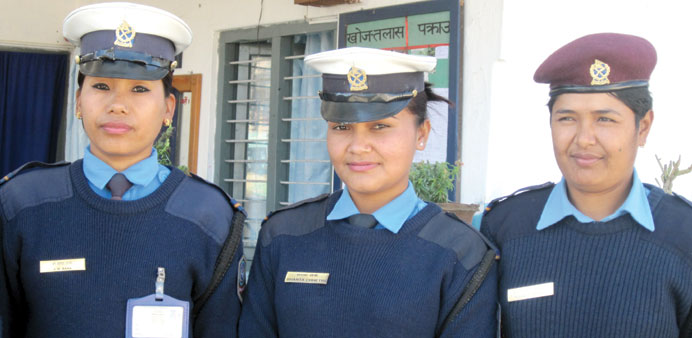Traffic policewomen Sanischar Thapa (left), Shanta Chettri (centre) and Constable Manmaya Bhujel standing in front of their all-women police station in Chorepatan, Pokhara.
By Pratibha Tuladhar
A man slowed down his car outside the Chorepatan police station one night, leaned his head out the window and called out to the policewoman on duty.
“Want to go with me, you whore?” he shouted, and raced off.
A team of officers pursued and arrested him, and he was jailed for two months for causing a public disturbance.
“No one messes with the women police of Chorepatan,” Inspector Sushila Pradhan says. “Everyone around here knows we are tough.”
At a mere 158cm tall, 27-year-old Pradhan stands out in her navy blue Nepal Police uniform. For the past eight months, she has been commanding the station and its staff of 25 female officers.
“I feel proud that I have a chance to lead this group,” the six-year veteran says. “It’s a privilege to be a woman and still get to lead.”
The all-female force was the brainchild of Upendra Kanta Aryal, deputy inspector general of the national police.
“I thought that a station run by women would send the message that women police can independently tackle all kinds of crime,” he said. “Many people rejected the idea at first, but it has sustained so far.”
The station was established about three years ago in the tourism town of Pokhara, along the highway that connects the mountainous districts of Kaski and Syangja.
There are more than 60,000 police in Nepal, 3,457 of them women. The number of female officers has been steadily increasing and the government has set a 20% quota for women in the force.
Many still serve in lower positions, while others operate in the technical and engineering department or in nursing. “The status of women in the force has improved also in terms of work as more women who are educated are joining in,” says Pradhan, who is addressed by her colleagues as “Sir.”
She said she was motivated to join the force by the fact that her brother was a policeman. For some, the inspiration lay elsewhere.
“When I was little, I saw policemen on horseback in Kathmandu and decided I wanted to wear that uniform someday,” says Parvati Nepali, a sub-inspector who wears a smear of vermillion on her forehead, the sign of a married Hindu woman.
But being on the force is about more than sporting the uniform.
“We sacrifice family time as we’re always on duty in this profession,” says Nepali, who is also a mother of two.
In a country where strikes and demonstrations are common, police officers are on call around the clock.
And there are other challenges to address.
“Last month, we had to break up a gang fight in the Pumdi-Bhumdi village, near midnight,” Pradhan recalled. “We drove for an hour then walked uphill for a couple of hours, before pursuing men who were armed with kukris (curved knives) and swords.”
Pradhan also remembers several incidents when she was told not to “act smart” because she was “just a woman.”
It has sometimes been worse.
“A child had died in an accident and we were preparing to lift the body for autopsy,” Nepali said. “Women relatives of the deceased called us whores and cursed our children dead, too.”
Being in a village with a low level of literacy level also makes their task more challenging, the officers say.
“The fact that we’re women means we have to work harder than our male colleagues to convince people,” says sub-inspector Thaman Kumari Ranabhat. Living in a barracks filled with women colleagues provides a family-like atmosphere, but the officers say there are times that they could use a male hand, something the government is preparing to address.
“Most of the detainees are male and it is awkward when we have to take men to the toilet,” says Ranabhat. “Sometimes they’re so drunk, we have to drag them in and out of toilets.”
In the last three years, the Chorepatan police post has received awards and accolades for its work, along with public praise.
“It’s easier for us to approach them as they’re all women,” said Parvati Kunwar, who runs a local eatery. “They do regular rounds so there have been no hassles.”
But others disagree.
“A police station needs men,” said Bir Bahadur Thapa, a retired policeman and local resident. “Do you think women should run behind their kids or criminals?”
Such comments do not deter the officers of Chorepatan.
“We have to do our duty no matter what people say,” said Shanta Chettri, a 24-year-old traffic officer who has been on duty at the station for two years. “We shouldn’t let people think we’re weak.”
The station also has a counselling cell for those arrested on cases of drug abuse and a childcare centre. Besides the children of the duty officers, some missing, rescued and orphaned children are also cared for.
“When I joined the force, my brother used to say it would be difficult, but he’s proud of me right now,” says Pradhan, who thinks that nothing would change for her professionally after marriage.
“I feel we could do so much more,” she says with a smile. — DPA

